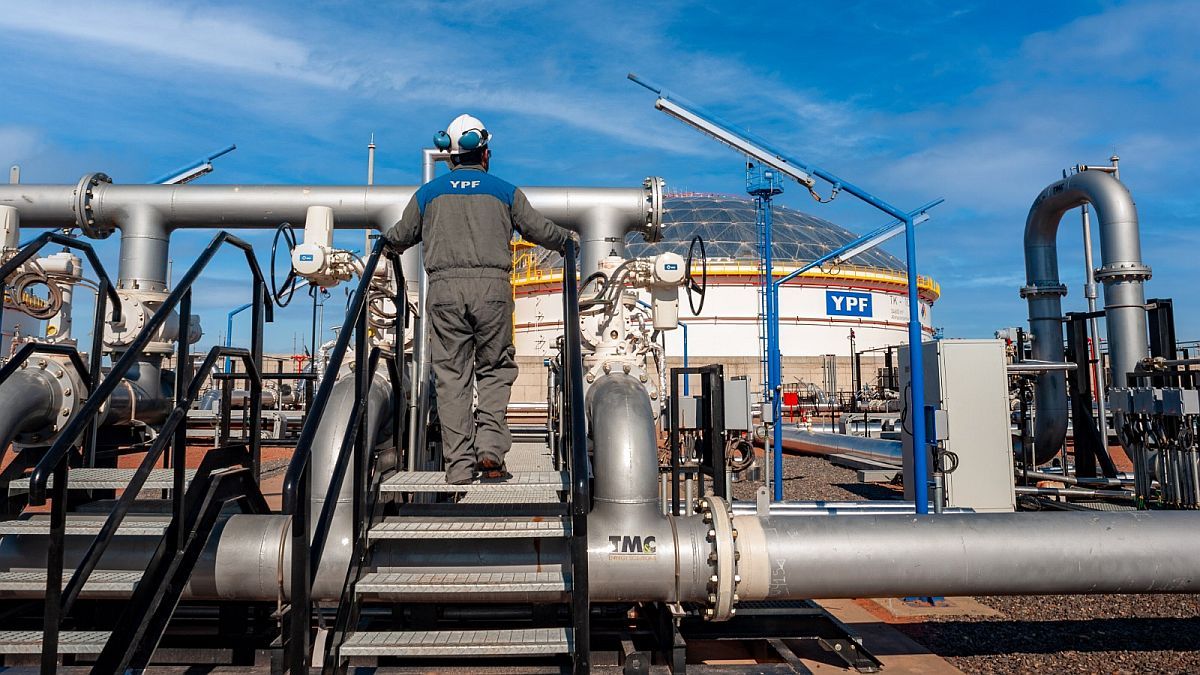“We firmly believe that the free market, respect for private property, is the best incentive for the innovation in infrastructure that everyone says we need. I have no doubt that innovation is going to happen”emphasized the coordinating secretary.
What articles will the national government regulate?
The Bases law 27,742 published last July 8and which curiously bears the signature of the vice president Victoria Villarruel and not the President, proposes two essential changes for the hydrocarbon industry.
Article 105.- Article 6 of Law 17,319 is replaced by the following:
Article 6: Permit holders and concessionaires will have control over the hydrocarbons they extract and, consequently, will be able to transport them, market them, industrialize them and commercialize their derivatives freely, in accordance with the regulations issued by the national Executive Branch.
The national Executive Branch may not intervene or set marketing prices in the domestic market for any of the activities indicated in the previous paragraph.
Permit holders, concessionaires, refiners and/or marketers may export hydrocarbons and/or their derivatives freely, subject to the non-objection of the Ministry of Energy. The effective exercise of this right will be subject to the regulations issued by the national Executive Branch, which among other aspects must consider: (i) the usual requirements linked to access to technically proven resources; and (ii) that the possible objection of the Ministry of Energy may only be formulated within thirty (30) days of informing it of the exports to be carried out, and must be based on technical or economic reasons that affect the security of supply. . After this period, the Ministry of Energy will not be able to make any objection.
Article 106.- Article 7 of Law 17,319 is replaced by the following:
Article 7: International trade in hydrocarbons will be free. The national Executive Branch will establish the import and export regime for hydrocarbons and their derivatives, ensuring compliance with the objective stated in article 3 and what is established in article 6.
Vaca Muerta will have 60 drilling rigs
During his presentation, he also asked to leave behind the yes or no oil debate and recommended promoting exhibitions. “When one looks at the estimates, the most optimistic one says that oil demand will begin to fall in 2030, but others say in 2045 or 2050. So, how could we be discussing whether oil yes, oil no in Argentina? “We have to develop all the oil we can as quickly as possible because there is a demand for oil in the world that has to be satisfied.”he stated.
“As we continue to solve the macro, as we have been doing, activity will double quickly. Today there are 30, 32, 33 drilling rigs, but we will easily get 50 or 60 drilling rigs. There is little we have to do from a regulatory point of view, other than get off and let the private parties create the conditions so that the private parties can invest. Because they want to invest, the proof is in how they have been investing until now,” he warned.
Daniel González: “Lots of projects will continue to enter the RIGI”
In this framework, González said that “he has no doubt” that this innovation is going to happen and he ignored the role of Incentive Regime for Large Investments (RIGI). “We have seen in the few weeks that RIGI is available to make applications the number of projects that have entered. Renewable energy, the oil pipeline, LNG, all the mining projects that have also entered, and lots will continue to enter” , he described.
Some of the projects already presented to the RIGI in addition to the VMOS, are the expansion of the YPF Luz’s El Quemado solar park in Mendoza, the diversified investment plan in San Juan de Minas Argentinas SA., a member company of AISA Groupwhich includes mining, renewable energy and industrial lime development, and the LNG export project of PAE and Golarwith an investment of US$2.9 billion for 10 years.
By insisting on the deregulation of the sector, Gónzález specified that in the RIGI “we are not creating special conditions or protections for one or the other” and added that “There are also sectors that have entered and others that have not. Those that have entered, everyone can enter. If the energies are renewable or thermal, we are not making a differentiation because we do not believe in the generation of unnatural incentives,” he stated.
González said that the Government believes that Argentina’s private sector is “tremendously vigorous” and estimated that as the “necessary conditions” are created, the private sector “will continue investing” to enhance the “tremendous opportunity that we have.” ” in Vaca Muerta and with the transition in public services.
“In the coming years we are going to have cheaper public services at the end of the day because populism ends in more expensive public services. If companies do not invest it is less efficient. We talk about smart grids, the smart grid comes from investments, investments come if the companies have a reasonable tariff. We believe that giving away energy was the worst solution, the worst measure that has affected both the transition and the cost of energy in general in Argentina,” he said.
Rate increase: “Argentine society is holding up well”
According to the coordinating secretary, when Javier MIlei took office, rates were received that covered only 30% of the energy cost, when now it is at 80%: “If they give people energy, it is impossible for there to be much energy efficiency”he maintained, adding that subsidies are also “a very bad public policy” from an investment point of view.”
“There is talk about investment in infrastructure, who is going to invest if companies lose money, cannot pay their dividends, if people in the end believe that energy is free,” he asked himself, and said that although with the rise of tariffs “it is logical that people feel that in some way they are touching their pockets,” also “It is very commendable how Argentine society is experiencing this change of character where suddenly they are paying for the cost of energy again and are holding up well.”
Investment deficit in electrical infrastructure reaches US$10 billion
Without mentioning possible power outages next summer, González assured that “for 30 years they told us that energy is free,” but that now a “cultural change” is being felt. “Covering 30% of the cost of energy, who is going to invest in smart networks, in electric transportation infrastructure? Is it going to be the State? We have a bankrupt State and that means that investments cannot be made by the State “, he stated.
In this framework, he recognized that there are US$10,000 million of investments in electrical transmission that should have been done. “In a few days we are going to announce the first tender for electrical transmission, precisely to start making gadgets on” the transmission network, but he clarified that “the National State is not going to do it, the private parties are going to do it,” he stressed.
The expansion of the Perito Moreno Gas Pipeline of TGS is declared of public interest
By highlighting that the energy works have to be carried out by the private sector, he announced that The national government will declare the TGS project to expand the country’s gas transportation network of general interest. “The best example is a private initiative presented by TGS, which probably tomorrow (Wednesday, November 26) we will be declaring of public interest”he advanced.
months ago, Transportadora Gas del Sur (TGS) proposed to the national government to use the RIGI to carry out transportation infrastructure works natural gas for US$700 million, which will allow the State to save a similar amount in 2026, with the substitution of imports of LNG and diesel to cover peak demand in winter.
TGS private initiative expansion of gas transportation PART 2
It is about the Private Initiative to Expand the Argentine Gas Transportation System (IPASTGA)that the company controlled by Pampa Energy and the family Sielecki, has already presented to the Ministry of Economy of Luis Caputoand as far as this media learned, was well received.
According to the details of the project you accessed Energy Reportthe main purpose of the private initiative is to make available significant incremental volumes of natural gas in the Coastal area, with 14 million cubic meters per day (MMm3/d) additional from June 2026.
As he said Daniel Gonzalezif this initiative succeeds, the Perito Moreno Gasduct (former Néstor Kirchner) The National State is not going to expand it. and the off-taker, that transport, is not going to be the National State either. “The gas pipeline is supported by a private sector with contracts with other private companies. This change of paradigm is better, it shows that eight months after the start of the government, Argentina’s private sector is prepared for this change,” he stressed.
Source: Ambito




